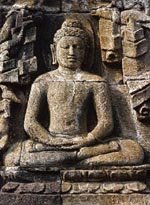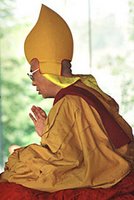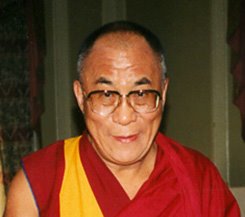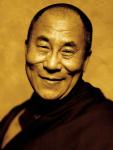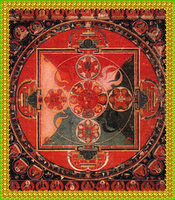Wednesday, May 31, 2006
Tuesday, May 30, 2006
Monday, May 29, 2006
The Dalai Lama's Letter To President Bush After 9/11
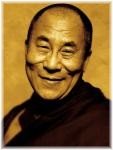 September 12, 2001
September 12, 2001His Excellency Mr. George W. Bush
The President
The White House
Washington, DC 20500
U.S.A.
Your Excellency,
I am deeply shocked by the terrorist attacks that took place involving four apparently hijacked aircrafts and the immense devastation these caused. It is a terrible tragedy that so many innocent lives have been lost and it seems unbelievable that anyone would choose to target the World Trade Center in New York City and the Pentagon in Washington, D.C. We are deeply saddened. On behalf of the Tibetan people I would like to convey our deepest condolence and solidarity with the American people during this painful time. Our prayers go out to the many who have lost their lives, those who have been injured and the many more who have been traumatized by this senseless act of violence. I am attending a special prayer for the United States and its people at our main temple today.
I am confident that the United States as a great and powerful nation will be able to overcome this present tragedy. The American people have shown their resilience, courage and determination when faced with such difficult and sad situations.
It may seem presumptuous on my part, but I personally believe we need to think seriously whether a violent reaction is the right thing to do and in the greater interest of the nation and people in the long run. I believe violence will only increase the cycle of violence. But how do we deal with hatred and anger which are often the root causes of such senseless violence? This is a very difficult question, especially when it concerns a nation and we have certain fixed conceptions of how to deal with such attacks. I am sure you will make the right decision.
With my prayers and good wishes,
Yours sincerely,
The Dalai Lama
Thursday, May 25, 2006
Tuesday, May 23, 2006
Saturday, May 20, 2006
Thursday, May 18, 2006
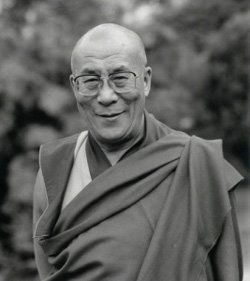 In our daily lives problems are bound to arise. The biggest problems in our lives are the ones that we inevitably have to face, like old age, illness, and death. Trying to avoid our problems or simply not thinking about them may provide temporary relief, but I think that there is a better approach. If you directly confront your suffering, you will be in a better position to appreciate the depth and nature of the problem. If you are in a battle, as long as you remain ignorant of the status and combat capability of your enemy, you will be totally unprepared and paralyzed by fear. However, if you know the fighting capability of your opponents, what sort of weapons they have and so on, then you're in a much better position when you engage in war. In the same way, if you confront your problems rather than avoid them, you will be in a better position to deal with them.
In our daily lives problems are bound to arise. The biggest problems in our lives are the ones that we inevitably have to face, like old age, illness, and death. Trying to avoid our problems or simply not thinking about them may provide temporary relief, but I think that there is a better approach. If you directly confront your suffering, you will be in a better position to appreciate the depth and nature of the problem. If you are in a battle, as long as you remain ignorant of the status and combat capability of your enemy, you will be totally unprepared and paralyzed by fear. However, if you know the fighting capability of your opponents, what sort of weapons they have and so on, then you're in a much better position when you engage in war. In the same way, if you confront your problems rather than avoid them, you will be in a better position to deal with them.-His Holiness the Dalai Lama
Wednesday, May 17, 2006
 I would like to explain the meaning of compassion, which is often misunderstood. Genuine compassion is based not on our own projections and expectations, but rather on the rights of the other: irrespective of whether another person is a close friend or an enemy, as long as that person wishes for peace and happiness and wishes to overcome suffering, then on that basis we develop genuine concern for his or her problem. This is genuine compassion. Usually when we are concerned about a close friend, we call this compassion. This is not compassion; it is attachment. Even in marriage, those marriages that last only a short time do so because of attachment - although it is generally present - but because there is also compassion. Marriages that last only a short time do so because of a lack of compassion; there is only emotional attachment based on projection and expectation. When the only bond between close friends is attachment, then even a minor issue may cause one's projections to change. As soon as our projections change, the attachment disappears - because that attachment was based solely on projection and expectation. It is possible to have compassion without attachment - and similarly, to have anger without hatred. Therefore we need to clarify the distinctions between compassion and attachment, and between anger and hatred. Such clarity is useful in our daily life and in our efforts towards world peace. I consider these to be basic spiritual values for the happiness of all human beings, regardless of whether one is a believer or a nonbeliever.
I would like to explain the meaning of compassion, which is often misunderstood. Genuine compassion is based not on our own projections and expectations, but rather on the rights of the other: irrespective of whether another person is a close friend or an enemy, as long as that person wishes for peace and happiness and wishes to overcome suffering, then on that basis we develop genuine concern for his or her problem. This is genuine compassion. Usually when we are concerned about a close friend, we call this compassion. This is not compassion; it is attachment. Even in marriage, those marriages that last only a short time do so because of attachment - although it is generally present - but because there is also compassion. Marriages that last only a short time do so because of a lack of compassion; there is only emotional attachment based on projection and expectation. When the only bond between close friends is attachment, then even a minor issue may cause one's projections to change. As soon as our projections change, the attachment disappears - because that attachment was based solely on projection and expectation. It is possible to have compassion without attachment - and similarly, to have anger without hatred. Therefore we need to clarify the distinctions between compassion and attachment, and between anger and hatred. Such clarity is useful in our daily life and in our efforts towards world peace. I consider these to be basic spiritual values for the happiness of all human beings, regardless of whether one is a believer or a nonbeliever.-His Holiness the Dalai Lama
Monday, May 15, 2006
 My message is the practice of compassion, love and kindness. Compassion can be put into practice if one recognizes the fact that every human being is a member of humanity and the human family regardless of differences in religion, culture, color and creed. Deep down there is no difference.
My message is the practice of compassion, love and kindness. Compassion can be put into practice if one recognizes the fact that every human being is a member of humanity and the human family regardless of differences in religion, culture, color and creed. Deep down there is no difference.-His Holiness the Dalai Lama
Sunday, May 14, 2006
Saturday, May 13, 2006

Nowadays the world is becoming increasingly materialistic, and mankind is reaching toward the very zenith of external progress, driven by an insatiable desire for power and vast possessions. Yet by this vain striving for perfection in a world where everything is relative, they wander even further away from inward peace and happiness of the mind.
-His Holiness the Dalai Lama
-His Holiness the Dalai Lama
Friday, May 12, 2006
Tuesday, May 09, 2006
Monday, May 08, 2006

A new way of thinking has become the necessary condition for responsible living and acting. If we maintain obsolete values and beliefs, a fragmented consciousness and self-centered spirit, we will continue to hold onto outdated goals and behaviors. Such an attitude by a large number of people would block the entire transition to an interdependent yet peaceful and cooperative global society.
-His Holiness the Dalai Lama
-His Holiness the Dalai Lama
Friday, May 05, 2006
Wednesday, May 03, 2006

I believe that the very purpose of our life is to seek happiness. That is clear. Whether one believes in religion or not, whether one believes in this religion or that religion, we all are seeking something better in life. So, I think, the very motion of our life is towards happiness.
-His Holiness the Dalai Lama
-His Holiness the Dalai Lama
Tuesday, May 02, 2006

Each of us in our own way can try to spread compassion into people's hearts. Western civilizations these days place great importance on filling the human "brain" with knowledge, but no one seems to care about filling the human "heart" with compassion. This is what the real role of religion is.
-His Holiness the Dalai Lama
-His Holiness the Dalai Lama
Monday, May 01, 2006

I believe that the very purpose of life is to be happy. From the very core of our being, we desire contentment. In my own limited experience I have found that the more we care for the happiness of others, the greater is our own sense of well-being. Cultivating a close, warmhearted feeling for others automatically puts the mind at ease. It helps remove whatever fears or insecurities we may have and gives us the strength to cope with any obstacles we encounter. It is the principal source of success in life. Since we are not solely material creatures, it is a mistake to place all our hopes for happiness on external development alone. The key is to develop inner peace.
-His Holiness the Dalai Lama
-His Holiness the Dalai Lama

